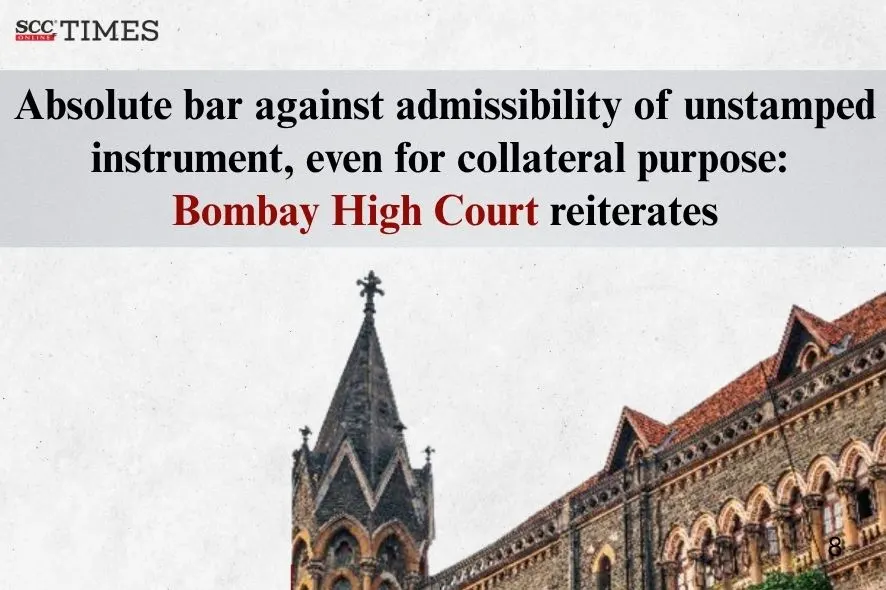Bombay High Court: In a dispute regarding the nature of the agreement wherein, parties failed to fully execute the agreement, the Single Judge Bench of S. G. Chapalgaonkar, J opined that where the agreement was neither registered nor properly stamped, then admitting the unstamped instrument even for collateral purpose, would amount to receiving such document in evidence which is prohibited under Section 35 of Stamp Act, 1899 (‘Stamp Act’). The Court stated that there is absolute bar against admissibility of unstamped instrument, be it for main or collateral purpose, unless requirements of proviso (A) to Section 35 of Stamp Act are complied with. Accordingly, the Court quashed and set aside the order of temporary injunction.
Background
The petitioner was the owner of the suit property, who executed a notarised agreement to sell the suit land to the respondent for a consideration of Rs. 92,50,000. An earnest money of Rs. 22,00,000 was paid for the same. The intention of the agreement was to give permission to the plaintiff to develop land and create saleable plots over the suit property. After selling the plots, the remainder consideration had to be paid in installments within a time limit. The defendant was to execute receipt of payment from time to time and had to execute documents in favour of prospective purchasers of plots.
On the other hand, defendant was under obligation to clear-off encumbrances upon suit plots and finally execute sale deed of balance land by 25-6-2022 after receiving total consideration. Plaintiff was ready to pay balance consideration amount and requested defendant to clear-off loans, however, he failed to do so and execute the sale deed while the defendant stated that he was intending to develop property and convert it into saleable plots; therefore, the agreement was executed. Additionally, plaintiff failed to develop property or sell out plots within specified time limit.
The dispute went to Trial Court, where the Trial Court temporarily injuncted defendant from alienating suit property by any mode or disturbing possession of plaintiff till disposal of suit, except by following due process established by law. The aforesaid order was subjected to challenge before the District Judge who affirmed order and dismissed appeal. Aggrieved by the same, the petitioner approached the present Court.
Analysis, law and decision
The Court noted that the parties have admitted the execution of the notarised agreement and payment of Rs. 22,00,000 as earnest money in pursuance of the said agreement. It was also admitted that possession of property was never delivered. Plaintiff had assured for development carve out saleable plots. It was contended that the plaintiff never intended to purchase property for himself, but to assist development of plots for defendant without taking possession of property.
The Court observed that the agreement to sell was neither registered nor sufficiently stamped. It was executed on Rs. 100/- bond paper and was notarized. The agreement stipulated delivery of possession of suit property in favour of the plaintiff. The Court pointed out that document of agreement to sell could not have been considered for any purpose for accepting plaintiff’ case. If the contents of the agreement to sell were ignored for want of its admissibility, there was nothing on record to depict that plaintiff had received possession of suit property and even the exact nature of transaction could not be ascertained.
The Court referred to the case of Yellapu Uma Maheswari v. Buddha Jagadheeswararao (2015) 16 SCC 787 where the Supreme Court held that if party wanted to rely upon document for collateral purpose, it was upon for him to pay stamp duty together with penalty and get document impounded.
Relying on the abovementioned case, the Court stated that previous Courts have erroneously observed that prima facie value of document could be adjusted at the time of granting interim injunction. Such observations are not in tune with settled legal position as per Section 35(a) of the Stamp Act, 1899.
Therefore, the Court held that there is total and absolute bar as to admission of unstamped instrument, unless there is compliance with requirements of provisos to Section 35 and so if unstamped instrument is admitted even for collateral purpose, it would amount to receiving such document in evidence for a purpose which is prohibited under Section 35 of Stamp Act.
Accordingly, the Court quashed and set aside the order of temporary injunction passed against defendant to not disturb possession of plaintiff over suit property and restrained the respondent from alienating suit property by any mode of transaction.
[Salim Baig v. Sayyad Nawid, 2025 SCC OnLine Bom 2819, decided on: 29-7-2025]
Advocates who appeared in this case:
Advocate for the Appellants- J. M. Murkute, Advocate
Advocate for the Respondents- E. S. Potdar, Advocate


